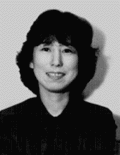|
The sun was already high. The loud voice of an udon noodle
peddler was calling from nowhere. "Udon no tamma, osoba
no tamma, oage-san ni tempura! Udon no tamma, osoba no tamma
...." Yoko heard the voice far away in the distance, in
her dream. Then she was suddenly awakened by a faint vibration.
She rubbed her eyes and sat straight up on the futon. "What
is it?" she wondered. "I must be excited," she
thought. Several seconds later she felt another shock and realized
that it was an earthquake. She jumped out of bed, climbed to
the window sill and jumped into the garden in her bare feet.
"Ouch! Oh, my God, ouch!" She had landed on a broken
piece of porcelain. Blood began to trickle from one of her toes.
"Ouch! Help! Help!" She ran into the house through
the front door and came across her mother making tea for her
father. Her mother frowned at her.
"Calm down," she snapped. "It's all right,
Yoko. Why don't you be more careful? You ought to remember the
old proverb, 'Look before you leap!'"
Later that day, after a simple lunch, father and daughter
went out together. They said little to each other. Yoko, in her
dark blue school uniform, followed her father a few steps behind.
He wore a dark spring coat and carried a little parcel wrapped
in a purple furoshiki cloth in his arm and a camera slung from
his shoulder. They walked in silence through the rain of falling
cherry blossoms in the park, through the huge wooden gates of
Todai Temple, by an ancient pond around which a few deer were
taking a walk and on into the dark, thick, moist forest of cedar
and pine until they reached an old wooden house.
Mr Nishimura stopped in front of the door. It creaked as he
slid it open.
"Gomenkudasai! Excuse me! Gomenkudasai!" His sharp,
loud voice echoed in the deep, dark wooden hallway.
"Tadaima, I'm coming." A middle-aged woman in kimono,
with straight hair in a bun, was hurrying down the hallway.
"Ah, Nishimura-san! Miss Mora is waiting for you,"
she said smiling at him. "Is this your daughter who wants
to talk with Miss Mora?"
"Yes, that's right. Yoko, say hello," Mr Nishimura
urged.
"Hello," Yoko said. She did not know who this woman
was, though she knew from the way they spoke that the woman must
be some kind of an acquaintance. A moment later the woman called
in a loud but clear, thin voice, looking up the steps, "Mora-sensei!
Mora-sensei!"
|
